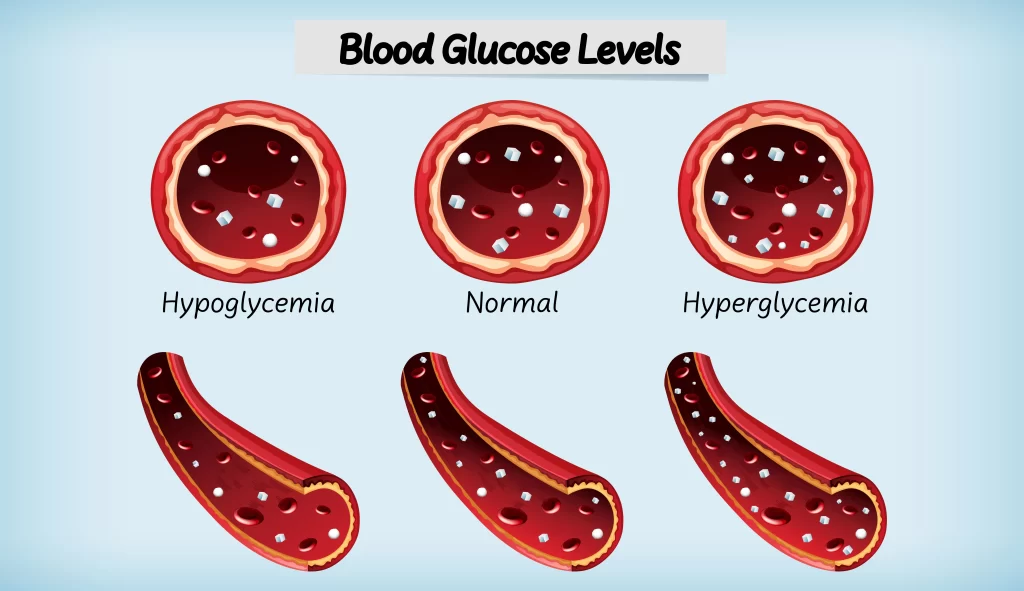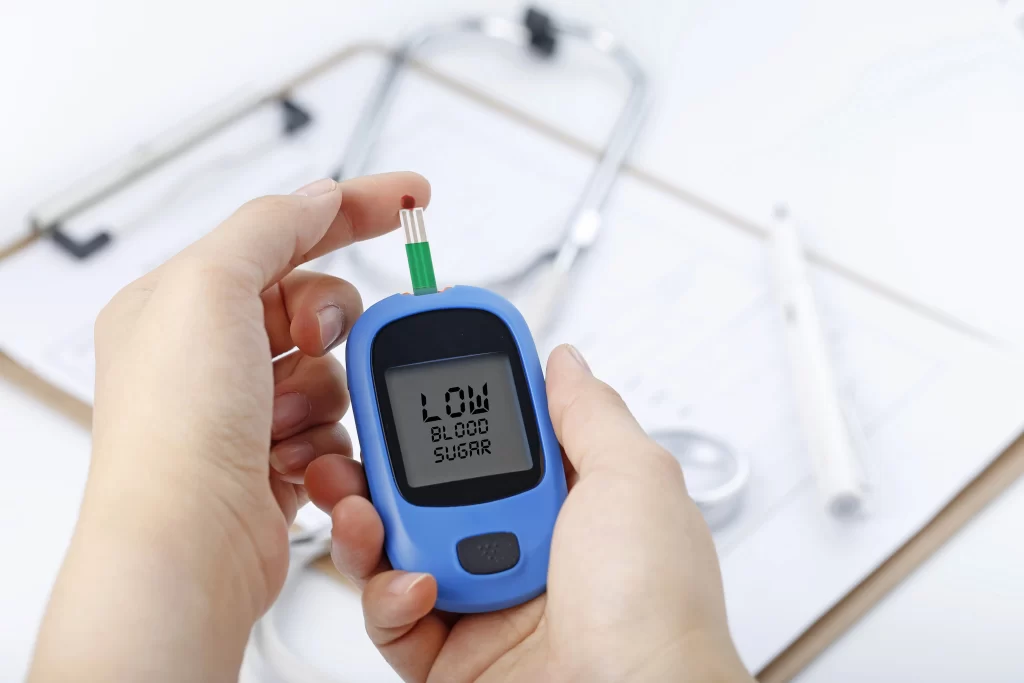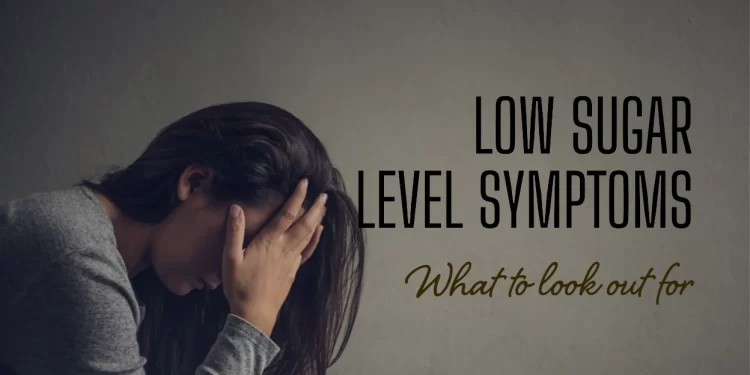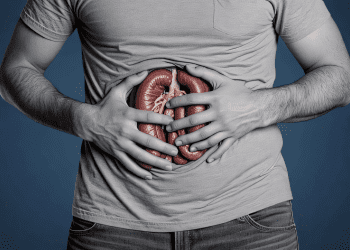Noticing your body acting strangely? It could be a sign of low sugar levels in your blood. Also known as hypoglycemia, this condition can manifest through various symptoms, such as dizziness, weakness, and fatigue.
Recognizing these low sugar level symptoms and knowing how to address them is crucial for maintaining a healthy lifestyle. Whether you have diabetes or simply want to ensure your blood sugar levels remain stable, this blog post is designed to provide valuable insights.
We will explore what hypoglycemia is, its common symptoms including nighttime low blood sugar, methods of diagnosis, available treatments, prevention strategies, and what to do in case of an occurrence. By gaining this knowledge, you will be empowered to stay informed, take necessary precautions, and receive appropriate treatment. So, let’s dive in and discover more about managing low sugar level symptoms effectively!
| Key Takeaways |
| Low blood sugar (hypoglycemia) can cause various symptoms |
| Prompt recognition of symptoms is important for timely intervention |
| Common low sugar level symptoms include dizziness, weakness, and fatigue |
| Untreated low blood sugar can lead to more serious medical problems |
| Causes of low blood sugar include lack of food, certain medications, and excessive alcohol consumption |
| Diagnosis involves seeking medical attention and blood sugar testing |
| Treatment options may include dietary changes, medications, lifestyle modifications, and regular glucose monitoring |
| Newborn babies are susceptible to low blood sugar, and vigilance is important |
| Seek immediate medical attention if you suspect hypoglycemia in a newborn baby |
| Glucose meters are useful for monitoring blood sugar levels |
| Managing low blood sugar involves a healthy diet, exercise, and stress management |
| Seek medical attention for low blood sugar symptoms |
| Consulting with a healthcare provider is essential for diagnosis and personalized treatment |
| Understanding and managing low blood sugar is crucial for overall well-being |
What is Low Blood Sugar (Hypoglycemia)?
Hypoglycemia is a medical condition in which the levels of sugar in the blood, glucose is too low, leading to low sugar level symptoms. This condition is often associated with diabetes when their blood sugar is low. However, it can also be caused by various other health issues, such as a lack of food, certain medications, or excessive alcohol consumption. The symptoms of low blood glucose can range from mild to severe, and it’s important to recognize them for prompt intervention.
Common low sugar level symptoms include dizziness, shakiness, anxiety, fatigue, sweating, confusion, irritability, blurred vision, and hunger. These symptoms can vary from person to person and may sometimes be mistaken for other medical conditions. Paying attention to your body and being aware of the signs of hypoglycemia is crucial.
When the body doesn’t have enough sugar, particularly in individuals with diabetes, it struggles to produce the energy required for proper bodily functions. If left untreated, low blood sugar can lead to more serious medical problems, such as a coma or even death. Recognizing the signs and taking steps to restore balance is therefore of utmost importance.

Signs and Symptoms of Low Sugar Level
One of the main symptoms of low blood sugar is feeling weak or lightheaded, which can potentially lead to fainting. In addition, low sugar level symptoms often include hunger, shakiness, confusion, sweating, difficulty thinking, blurred vision, irritability, and fatigue.
These symptoms, associated with low blood glucose, can manifest differently in each individual and may be mistakenly attributed to other medical conditions. It is crucial to listen to your body and be vigilant in recognizing the signs of hypoglycemia. If you experience any of the aforementioned symptoms, it is important to take immediate steps to restore balance and seek medical attention if necessary.
You can proactively address and manage hypoglycemia by being aware of the low sugar level symptoms and understanding their significance. Prompt recognition, appropriate interventions, and seeking medical guidance, when needed, are essential in maintaining optimal health and well-being.
Causes of Low Blood Sugar: Understanding and Seeking Treatment
There are several different causes of low blood sugar, leading to low sugar level symptoms. These causes include a lack of food, taking certain medications that can affect glucose levels, drinking too much alcohol, or having an underlying medical condition, such as diabetes. Additionally, certain types of cancers, infections, and illnesses can contribute to hypoglycemia and the manifestation of low sugar level symptoms.
It is important to recognize the signs of low blood sugar, including symptoms of when your blood glucose is too low, and seek medical attention if you experience any of these symptoms. Your doctor will be able to determine if diabetes could be to blame for your low blood sugar levels and help you find the best treatment option for your unique situation.
Diagnosis and Treatment Options
If you are experiencing low sugar level symptoms, it is important to seek medical attention promptly. Your doctor will be able to diagnose your low blood sugar levels and find the best treatment option for you.
Treatment strategies may involve dietary changes, such as increasing your intake of sugar or carbohydrates or taking medications that help regulate and elevate your blood sugar levels. Lifestyle modifications, such as regular exercise and balanced meal planning, may also be recommended to help manage your condition and maintain healthy blood sugar levels.
By addressing low blood sugar through accurate diagnosis and appropriate treatment, you can effectively manage the condition and mitigate potential complications. Collaborating with your healthcare provider and following their guidance is crucial in ensuring the best possible care and optimizing your overall well-being.

Babies with Low Sugar Symptoms: Understanding and Caring for Newborns
Newborn babies are susceptible to low blood sugar, known as hypoglycemia, which can have significant implications for their health. Various factors, including prematurity and low birth weight, can contribute to the development of hypoglycemia in newborns. The gestational age of a baby plays a crucial role in determining their risk of experiencing low sugar level symptoms.
Babies born before 37 weeks of gestation, especially those who are small for their gestational age, have a higher likelihood of developing hypoglycemia. It is vital for parents and caregivers to be vigilant and recognize the signs and symptoms of hypoglycemia in a newborn baby to ensure their well-being.
The symptoms of hypoglycemia in a newborn baby may include jitters, poor feeding, excessive sleepiness, irritability, weak or high-pitched crying, and even seizures. Prompt recognition of these low sugar level symptoms is essential for timely intervention.
If you suspect that your newborn baby is experiencing hypoglycemia, it is crucial to seek immediate medical attention. Healthcare professionals can perform blood sugar tests to confirm the diagnosis and provide appropriate treatment. In some cases, they may administer intravenous glucose or recommend frequent feedings to stabilize the baby’s blood sugar levels.
As a parent, it is vital to follow the guidance and instructions provided by your healthcare provider regarding feeding schedules, monitoring blood sugar levels, and seeking medical assistance if needed. Proper management of hypoglycemia in newborn babies is essential for their overall health and development.
By being aware of the risks, recognizing the symptoms, and taking proactive measures, parents and caregivers can play a pivotal role in ensuring the well-being of newborns experiencing low sugar level symptoms.
Dangers of Low Blood Sugar: Recognizing Risks and Taking Action
If left untreated, low blood sugar, or hypoglycemia, can give rise to a range of low sugar level symptoms and potentially lead to more serious medical complications, such as a coma or even death. It is vital to be able to identify the signs of low blood sugar and take immediate steps to restore balance and protect your well-being. If you are experiencing the symptoms of hypoglycemia, where your blood glucose level is too low, it is crucial to seek medical attention promptly.
How to Test Your Sugar Level: Monitoring and Managing Hypoglycemia
To effectively monitor your sugar levels and take proactive measures to prevent hypoglycemia, the best way is to use a glucose meter. This invaluable device enables you to measure your blood sugar levels conveniently and make informed decisions to maintain optimal levels and avoid low sugar level symptoms. Your doctor may also recommend additional laboratory testing to confirm the diagnosis and provide a comprehensive assessment of your glucose levels.
| Blood Sugar Level (mg/dL) | Classification |
| Below 70 | Low blood sugar |
| 70-99 | Normal range |
| 100-125 | Prediabetes |
| 126 and above | Diabetes |

Tips for Managing Low Sugar Level: Taking Control of Your Health
There are several practical steps you can take to effectively manage your low blood glucose level and mitigate the risk of hypoglycemia. Adopting a healthy diet that prioritizes a balanced intake of carbohydrates can help regulate and maintain stable blood sugar levels. It is equally important to limit the consumption of sugary drinks and moderate alcohol intake, as these can disrupt glucose balance.
Additionally, ensuring sufficient sleep and engaging in regular exercise are essential for promoting overall well-being and managing blood sugar levels. Maintaining a healthy weight through a well-rounded lifestyle can contribute to stabilizing blood sugar levels.
Lastly, managing stress levels and finding time for relaxation are vital components of a comprehensive approach to preventing low blood sugar symptoms and promoting overall health.
By understanding the dangers of low blood sugar, regularly monitoring your sugar levels, and implementing practical lifestyle strategies, you can take control of your health and reduce the risk of experiencing low sugar level symptoms.
When to See a Doctor for Low Blood Sugar: Recognizing the Signs and Seeking Medical Attention
Suppose you are experiencing any of the signs and symptoms associated with low blood sugar, such as dizziness, shakiness, anxiety, fatigue, sweating, confusion, irritability, blurred vision, and hunger. In that case, it is crucial to seek prompt medical attention. Recognizing these low sugar level symptoms is vital for timely diagnosis and appropriate management.
Consulting with your doctor is essential in determining the underlying cause of your low blood sugar and finding the best treatment option for your unique situation. A healthcare professional can conduct a thorough evaluation, which may involve reviewing your medical history, performing blood tests, and assessing your overall health.
By understanding your specific circumstances, your doctor can provide personalized recommendations, including lifestyle modifications, dietary changes, or medications, to help you maintain healthy blood sugar levels.
Additionally, your doctor may advise regular glucose testing to monitor your blood sugar levels over time. This monitoring allows for ongoing assessment and adjustment of your treatment plan, ensuring that your low blood sugar is effectively managed and mitigating the risk of recurring symptoms.
Recognizing the importance of seeking medical attention for low blood sugar is key to effectively managing this condition. By consulting with your doctor, you can receive the necessary support, guidance, and treatment to maintain stable blood sugar levels and prevent further complications.
Final Thoughts: Empowering Yourself in Managing Low Blood Sugar Levels
Hypoglycemia, or low blood sugar, is a condition that requires attention and proactive management. Recognizing the signs of low sugar level symptoms, including those associated with blood, is crucial for early intervention and effective treatment. Seeking timely medical attention when needed and understanding the underlying causes, diagnosis, and available treatments are key to successfully managing hypoglycemia and maintaining a healthy lifestyle.
It’s important to note that low blood sugar can present itself differently in individuals, and symptoms may vary. Some individuals may experience symptoms of anxiety and its associated manifestations when their blood sugar level is very low.
This anxiety, alongside other low sugar level symptoms, can act as an important indicator that your glucose level needs immediate attention. For individuals with diabetes, managing blood sugar levels becomes even more critical. Ensuring a consistent and adequate supply of sugar into the blood through appropriate dietary choices and, when necessary, medication can significantly help in preventing episodes of low blood sugar and maintaining stable glucose levels.
Being aware of the symptoms of low blood sugar, understanding the significance of prompt diagnosis and treatment, and taking proactive steps to manage your blood sugar levels is vital for your overall well-being. Remember to consult with your healthcare provider for personalized guidance on managing hypoglycemia and maintaining optimal glucose control.
FAQ: Low Sugar Level Symptoms
Q: What are the symptoms of low blood sugar?
A: The symptoms of low blood sugar, also known as hypoglycemia, can vary from person to person. Common symptoms include shakiness, dizziness, sweating, weakness, confusion, headache, irritability, blurred vision, difficulty concentrating, and increased heart rate.
Q: What are the dangerous low sugar levels?
A: Dangerous low blood sugar levels can be categorized based on the measurement of blood glucose levels. Generally, a blood sugar level below 70 milligrams per deciliter (mg/dL) is considered low and may require immediate attention. However, individual responses to low blood sugar can vary, and some individuals may experience symptoms even at slightly higher levels.
Q: What happens when someone has low blood sugar?
A: When someone has low blood sugar, it means there is not enough glucose (sugar) available for the body’s cells to function properly. Glucose is the primary source of energy for the brain and other organs. When blood sugar levels drop too low, it can lead to a variety of symptoms affecting the nervous system, including dizziness, confusion, and weakness. In severe cases, low blood sugar can cause unconsciousness or seizures.
Q: What are the symptoms if your sugar level is low?
A: Symptoms of low blood sugar can vary, but common signs include shakiness, sweating, dizziness, weakness, confusion, headache, irritability, blurred vision, difficulty concentrating, and an increased heart rate. Some individuals may also experience hunger, anxiety, tingling sensations, or mood changes when their sugar levels are low.
Q: Why does having low blood sugar result in dizziness?
A: Low blood sugar can cause dizziness because glucose is the primary fuel source for the brain. When blood sugar levels drop, the brain may not receive enough energy to function properly. This can lead to symptoms such as dizziness, lightheadedness, and difficulty maintaining balance.
Q: What is the difference between blood sugar and low blood pressure?
A: Blood sugar and blood pressure are two distinct measurements related to different aspects of the body’s functioning. Blood sugar refers to the concentration of glucose (sugar) in the blood, which serves as a primary source of energy. Low blood sugar, or hypoglycemia, occurs when blood glucose levels drop below normal. On the other hand, blood pressure measures the force of blood against the walls of the arteries as the heart pumps it. Low blood pressure, or hypotension, refers to a lower-than-normal blood pressure reading, which can cause symptoms like dizziness and lightheadedness.
Q: Can low blood sugar cause death?
A: While low blood sugar can be a serious condition, especially if left untreated, it does not typically lead to death on its own. However, severe cases of hypoglycemia can cause unconsciousness or seizures, which can be life-threatening if not promptly addressed. Additionally, if low blood sugar causes someone to lose consciousness and they are unable to consume glucose or receive appropriate medical treatment, it can potentially result in life-threatening complications.
Q: Why does low blood sugar cause nausea?
A: Low blood sugar can cause nausea due to the body’s response to hypoglycemia. When blood sugar levels drop, the body releases stress hormones like adrenaline and cortisol as a defense mechanism. These hormones can stimulate the release of stomach acid, leading to feelings of nausea and even vomiting in some individuals.
Q: Why does low blood sugar cause shaking?
A: Low blood sugar can cause shaking or tremors because glucose is essential for muscle function and coordination. When blood sugar levels drop, the body responds by releasing stress hormones, which can trigger a shaky sensation. These tremors typically affect the hands, but they can also affect other parts of the body.
Q: Why is my blood sugar low?
A: There can be several reasons for low blood sugar levels. The most common cause is diabetes medication, such as insulin or certain oral medications, which can lower blood sugar levels. Other potential causes include excessive physical activity without adequate food intake, delayed or missed meals, excessive alcohol consumption, certain medical conditions, hormone deficiencies, and certain medications. If you’re experiencing persistent or recurrent low blood sugar, it is recommended to consult with a healthcare professional to determine the underlying cause and appropriate management strategies.












